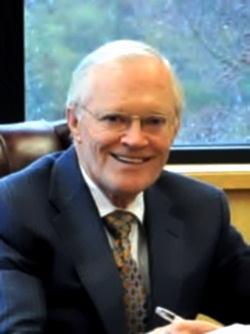London Calling - Mary's Dowry
As in the doctrine of the Assumption, Roman Catholic believers in many nations honour Mary to a degree that makes most Protestants uncomfortable. Yet, unique among all the nations, only the Roman Catholics of England have the concept that their nation is in a special way the "Dowry of Mary."
Exactly 60 years ago this November, Pope Pius XII declared as a dogma of the Roman Catholic Church the teaching that Mary, the mother of Jesus, was taken bodily to heaven at the end of her life. Each August 15, Roman Catholics celebrate a holiday known as the "Feast of the Assumption" commemorating this belief—which remains one of the most notable "sticking points" dividing Roman Catholic and Protestant believers.
As in the doctrine of the Assumption, Roman Catholic believers in many nations honour Mary to a degree that makes most Protestants uncomfortable. Yet, unique among all the nations, only the Roman Catholics of England have the concept that their nation is in a special way the "Dowry of Mary."
English speakers commonly associate the word "dowry" (from the Latin dos, meaning "donation") with the donation accompanying a bride. In medieval English law, however, the meaning is reversed—a husband would set apart a portion of his estate designated for the maintenance of his wife, should she become a widow. Those who consider England "Mary's Dowry" take it in that sense—that, historically, England has been "set apart" for Mary in a way that no other country has been.
How did this devotion originate? King Richard II, in 1381, formally dedicated England to Mary in a ceremony at Westminster Abbey, but tradition places its origin hundreds of years earlier, even back to one of the last Anglo-Saxon Kings, Edward the Confessor, who reigned from 1042–1066.
Until the Protestant Reformation, many kings of England perpetuated this devotion to Mary—including Henry V, who supposedly raised the battle cry at Agincourt, "Our Lady for her Dowry; St George and St Edward to our aid."
After rebellious King Henry VIII renounced Catholic authority in England, and established the Church of England—the Anglican Church—as the sole ecclesiastic authority under his rule, the Papal See has tried different methods of bringing a recalcitrant daughter back to her mother. One of the most famous was Pope Sixtus VI's blessing of the Spanish Armada in 1588. The Archbishop of Lisbon said a special Mass for the Armada's success in battle against the forces of the "heretic" Queen Elizabeth I, and pronounced a blessing on all those in the Spanish fleet, absolving them in advance for any deaths that they would inflict on their English enemies.
God, however, must have been unconvinced by the archbishop's blessing. As most history students will remember, the Armada's mission was a disaster, with an estimated 11,000 Spanish mariners and soldiers losing their lives.
Still, English Catholics and their leaders in Rome have maintained a fervent devotion to Mary. In 1893, though Roman Catholicism had long since become a minority religion in Anglican England, Pope Leo XIII requested that England's Roman Catholic bishops re-consecrate their country to Mary, giving the popular devotion an official stamp of Vatican approval. Back then, however, this must have seemed like an empty gesture in the face of a powerful Anglican-led England.
Today, however, England has lost most of its former economic and military might. The Anglican Church, beset by internal controversies for several decades, is in even greater disarray after a decision made at the Anglican General Synod held in York in July 2010. At the enclave, "The Church of England's ruling body has said that women bishops should be allowed, paving the way for these ordinations despite objections from traditionalists... Providing most approve the idea, the legislation would return to the General Synod in 2012 for further drafting and final approval" (Agence France-Presse, July 13, 2010, "Women Bishops Should be Allowed").
Crossing the Tiber?
Pope Benedict XVI recently established new protocols to make it easier for Anglican clergy and their congregations to convert, en masse, to Roman Catholicism—even allowing married Anglican priests to remain married while functioning as Roman Catholic priests. In the present environment, with as many as a third of the Anglican clergy unhappy with the decision to ordain female bishops, this option may be more tempting than ever to some conservative clerics and parishioners.
However, there are degrees of conservatism among the dissatisfied clerics. Some who object to women's ordination still find certain Roman Catholic doctrines a stumbling block, including the degree to which Roman Catholicism mandates a veneration of Mary beyond what they can justify from Scripture and the tradition of the early Church. After all, what was perceived as "Mary worship" was well and truly renounced by the Reformers, especially Oliver Cromwell and the Puritans.
It is in this environment that Benedict's September visit to England took on special significance. Around the world, Roman Catholicism is being battered by charges not only that its priests are guilty of widespread sexual misconduct, but also that a culture of cover-up encourages its bishops to hide, deny and suppress evidence of misconduct. Although the scandal first gained attention in the United States, bishops around the globe have resigned in scandalous circumstances, including Roger Vangheluwe, bishop of Bruges, Belgium.
Will the current scandals ruin the Roman Catholic Church? Benedict knows that his church has endured far worse storms over the centuries. And he has his eye on the long-term future of Roman Catholicism. Some perceive that his visit to England gave him a rare opportunity to strike at an opponent in its moment of weakness.
A recent report speaks of a new department being created by Pope Benedict that plans to stem the decline in church attendance across the Catholic world—especially in the West. "The new department to be called 'The Pontifical Council for New Evangelisation' will try to reinvigorate belief among Catholics in rich, developed countries—or in the Pontiff's words, 'find the right means to re-propose the perennial truth of the Gospel'" (The Daily Telegraph, London, June 30, 2010, p. 17).
Many in the English Catholic community would like to see their country truly become Mary's Dowry, with a resurgence of Marian devotion that would have seemed unthinkable to the Protestant reformers. Roman Catholics make up only 10 percent of Britain's population. Though only one-tenth of them attend Mass regularly, those who do are usually ardent about their belief.
Mary: Icon or Obstacle?
At a time when Anglicanism is in crisis in its mother country, Benedict is reaching out to Roman Catholics and disaffected Anglicans alike, hoping to fulfil the dream of "Mary's Dowry"—of an England religiously united with Rome, under Mary. Yet Mary herself may be one of the greatest obstacles. Protestants acknowledge that Scripture calls her "blessed" to have the privilege of giving birth to Jesus Christ. Yet where Roman Catholics revere Mary as "ever-virgin," Protestants insist from Scripture that she did not remain a virgin in giving birth to Jesus' siblings (Matthew 12:46; Mark 3:31). Roman Catholics see Mary as a sinless near-equal of Jesus, a "Mediatrix of Graces" in spite of the clear biblical statement that only Jesus is Mediator (1 Timothy 2:5).
Will Roman evangelisation foster a revival of the Dowry of Mary as a concept of English religious identity? Will the adoration of Mary gain greater acceptance in England amongst the conservative elements of the Church of England? Or will Rome's emphasis on Marian devotion keep Anglicans within the Protestant fold? Scripture reveals that the Roman church will play an increasingly prominent role in end-time events. That role appears likely to come into conflict with long-standing Protestant sensibilities. Watch world events, and keep reading Tomorrow's World, for news of the coming religio-political entity that will bring England—and all of Europe, and indeed the world—to a prophesied time of unprecedented crisis just before the return of Jesus Christ.






